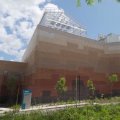A program involving University of Queensland researchers has dramatically boosted literacy rates in a cohort of almost 700 Queensland high school students.
Pupils at Bundamba Secondary College on average increased their reading comprehension levels by almost two Grade levels thanks to a specially designed half-hour lesson each day for a year.
Queensland Education Minister Anna Bligh’s Parliamentary Secretary and Member for Bundamba Jo-Ann Miller will officially launch a report on the program at 9.15am tomorrow (Friday, October 25) at Bundamba Secondary College’s assembly hall, Naomai Street, Bundamba.
The report analyses the first 12-months of the Literacy Enhancement Action Program (LEAP), implemented by the school in 2000 and developed in collaboration with two UQ researchers within the School of Education.
“After being approached by the high school’s principal, Barry Hopf, we evaluated almost 700 students’ reading comprehension levels,” said report author and senior lecturer in educational psychology Dr Carol Christensen.
“We found 85 percent of the students were reading more than one year below their chronological age, with 30 percent reading below Grade 4 level and only seven percent at or above their Grade level.”
After assisting in the development of LEAP, Dr Christensen and School of Education Head Professor Allan Luke helped the school’s staff develop an entirely new area of expertise – teaching basic literacy skills.
Teaching staff then taught half-hour intensive literacy lessons each day to three different streams of students (below Grade 4 literacy, upper-primary school literacy and exceptional or above Grade level literacy).
“I don’t know of any other school in Australia that has done anything like it. It was an astonishing effort and one year after its implementation we found extraordinary gains had been achieved,” Dr Christensen said.
“Students who were reading below Grade 4 level gained an average of 1.7 years in reading comprehension, thanks to a half-hour LEAP lesson each day. Students reading between a Grade 4 to 6 level gained an average of 1.9 years, with their scores increasing by a massive 45 percent.
“We also found that the percentage of the highest achieving students who were at or above Grade 12 level rose from 39 percent to 64 percent.”
Dr Christensen said the accomplishments of the program were not restricted to students’ literacy rates, with fundamental motivation and stance towards academic achievement also showing dramatic change.
“Students who had previously experienced years of failure and had become disaffected from school were seeing literacy learning as a challenge to be met,” she said.
“Not only were teachers incorporating literacy instruction into their regular classes but the library noted an increase in borrowing and a change in borrowing patterns, with students showing more interest in sequels and series.”
The school recently received $30,000 in prize money after the program was selected from 600 entries to win one of six Education Queensland Showcase Awards for Excellence. In September, the program also received a $1000 Achievement Award in the 2002 National Literacy and Numeracy Week Awards.
Dr Christensen said the way in which Bundamba Secondary College had addressed the challenges was exemplary and typified best-practice at an international level.
“The success of LEAP is entirely due to people within the school – the students, teaching and administration, and in particular, the professionalism, insight, commitment and sensitivity of the LEAP coordinators – Annette D’Alterio and Andrea Williams.
“Literacy needs to be interwoven into the fabric of students’ lives with society actively assisting with and promoting achievement otherwise a distinct culture of failure develops that characterises a lot of peer-group interactions.
“If the cycle of low motivation, minimal effort and poor learning is to be broken, fundamental transformations need to be made in the nature of teaching and learning in schools.
“LEAP provides a model of how transformations in the processes of teaching and learning can be accomplished, and as a consequence dramatic changes in student values, attitudes and learning can be achieved.
“By any measure LEAP has been a remarkable success and there has been dramatic gains in literacy achievement for students who previously had exhibited chronic and extreme levels of failure.”
Dr Christensen said she planned to work with Education Queensland’s Literate Futures Project, designed to assist schools implement innovative literacy programs.
Media: For further information, contact Dr Christensen (telephone 07 3876 8046 on Thursday, 07 3365 6634, email: c.christensen@uq.edu.au), Mr Hopf (telephone 3816 6333 after 12 noon if calling on Friday) or Joanne van Zeeland at UQ Communications (telephone 07 3365 2619, email: communications@uq.edu.au).



